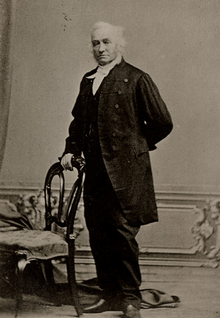Edward Hale (politician)
Edward Hale (December 6, 1800 – April 26, 1875) was a Quebec businessman and political figure.
Edward Hale | |
|---|---|
 | |
| Member of the Legislative Council of Quebec for Wellington | |
| In office 1867–1875 | |
| Preceded by | (New position) |
| Succeeded by | William Hoste Webb |
| Member of the Legislative Assembly of the Province of Canada for Sherbrooke | |
| In office 1841–1848 | |
| Preceded by | (New position) |
| Succeeded by | Bartholomew Gugy |
| Member of the Special Council of Lower Canada | |
| In office September 19, 1839 – February 10, 1841 | |
| Personal details | |
| Born | December 6, 1800 Quebec City, Lower Canada |
| Died | April 26, 1875 (aged 74) Quebec City, Quebec |
| Political party | Conservative |
| Relations | John Hale (father) Elizabeth Amherst Hale (mother) William Amherst, 1st Earl Amherst (uncle) Edward Hale (uncle) Jeffery Hale (brother) |
| Occupation | Businessman |
Family and early life
Hale was born in Quebec City in 1800, the son of John Hale, a British army officer who had settled in Lower Canada. His mother, Elizabeth Amherst Hale, was the sister of Lord William Pitt Amherst. Hale was educated in England and returned to Lower Canada in 1820, where he was named secretary to the auditor general for the province. From 1823 to 1828, he was secretary to his uncle, Lord Amherst, in India. After he returned to Lower Canada, he married Eliza Cecilia, the daughter of Edward Bowen, in 1831.
His brother Jeffery Hale, was a philanthropist at Quebec City. His uncle, also named Edward Hale, was seigneur of Portneuf.
Business career
Hale settled on a property on the Saint-François River in the Eastern Townships around 1834. He was a shareholder in the British American Land Company which was established to sell land in that part of the province.
Hale was also president of the Stanstead and Sherbrooke Mutual Fire Insurance Company. He was part of the committee that set up the St Lawrence and Atlantic Railway. In 1866, he was named chancellor for Bishop's College.
Political career
Hale served as secretary to the colonel of the local militia during the Lower Canada Rebellion. In September 1839, he was named to the Special Council which administered the province following the rebellion. He supported the resolutions passed in the council for the union of Upper and Lower Canada. His uncle Edward Hale was also a member of the Special Council at the same time.
In 1840, he was named warden for Sherbrooke district.
After the union, he was elected to the Legislative Assembly of the Province of Canada for Sherbrooke. He was reelected in 1844, but did not stand for election in the 1848 election.
After Confederation, Hale was named to the Legislative Council of Quebec for Wellington division and served until his death at Quebec City in 1875.
External links
- "Edward Hale". Dictionary of Canadian Biography (online ed.). University of Toronto Press. 1979–2016.
- "Biography". Dictionnaire des parlementaires du Québec de 1792 à nos jours (in French). National Assembly of Quebec.